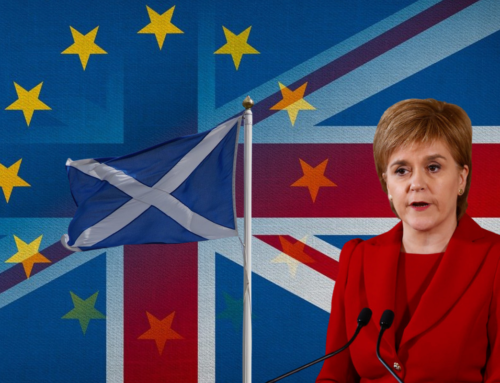
by Brendan Donnelly
Director, The Federal Trust
23rd October 2019
At the weekend the former Home Secretary Amber Rudd gave an interview that will usefully epitomise for future historians the moral and intellectual confusion on European issues of the One Nation wing of the Conservative Party she represents.
She had, she said, considerable reservations about the Prime Minister’s proposed new Withdrawal Agreement. She accepted that Brexit would seriously harm the economy; it created economic barriers between Northern Ireland and the rest of the United Kingdom; it was unpopular in Scotland and Wales; it presaged a more distant future relationship between the UK and the EU than she would wish; it might well lead to “no deal” in 2020; and it was right that Parliament should give itself more time to consider the Agreement, if necessary beyond the 31st October deadline. None of these considerations, however, dissuaded Ms. Rudd from eventually voting to support the new Withdrawal Agreement. She had been concerned that the Prime Minister was preparing to leave the European Union on 31st October with “no deal.” She was relieved that such was no longer the case. The nature of the “deal” proposed was of secondary importance. The simple existence of a “deal” was enough. She had reassured the Prime Minister that he could count on her support after Parliament had had the (face-saving) opportunity to consider the Agreement at greater length. All that mattered was to implement the narrow result of the referendum in 2016, a referendum won (as she well knows) on the basis of lies, law-breaking and delusion.
Such an abrogation of political coherence and representative responsibility is by no means confined to Conservative MPs. Elsewhere in the Parliamentary forest Labour MPs have been doing their best to match the contortions of their Conservative equivalents. Nineteen Labour MPs voted on Second Reading for the Prime Minister’s Withdrawal Agreement Bill (WAB). Most of them did so after having received reassurances from Boris Johnson in Parliament that he was mindful of their particular concerns on social, environmental or labour issues. That they should have sought and affected to accept such reassurances from a notoriously unreliable individual as the present Prime Minister, their sworn political opponent, will provoke similarly amused incredulity from future historians to that engendered by Amber Rudd. The Labour MPs in question needed to look no further than the DUP benches in Parliament to be reminded of the worth of any Johnsonian assurances.
Although his defeat on the proposed accelerated timetable for passing the WAB will have been an inconvenience, the Prime Minister can take some considerable satisfaction from the Parliamentary votes yesterday evening. His first significant Parliamentary victory – on the second reading of his WAB – was gained by the significant majority of 329 to 299. He can reasonably hope that a combination of irresolute Conservatives such as Amber Rudd and Sir Oliver Letwin (who favours the Bill as the “least evil”) and dissident Labour MPs will combine with his own cowed and regimented Party to achieve in the not too distant future a majority for his “deal.” He must, however, fear two possible pitfalls over the coming weeks and months: the possible splintering of the fragile coalition that supports him and the EU-27’s reaction to the now likely impossibility of his passing the Withdrawal Agreement through Parliament before 31st October.
Beware ambushes ahead
It is clear that the Prime Minister wished to ram the legislation through Parliament because he fears detailed scrutiny may expose the Bill to unwelcome amendment and loss of support from the disparate coalition on which he currently relies. His own shaky grasp of the detail of the Agreement was revealed yesterday for all to see. His opponents will hope to mount Parliamentary ambushes during further readings of the Bill that will perhaps render it unacceptable to one or other group of its present supporters. These might include the extension of the Customs Union to the whole of the United Kingdom; or the attachment of a further referendum as a condition of acceptance of the overall Withdrawal Agreement. Opinion within the Labour Party seems to be shifting in favour of a People’s Vote, but important pockets of resistance remain. The extension of the Customs Union has perhaps the better chance of success, since in theory it corresponds to current Labour policy on Brexit. Jeremy Corbyn has however made clear that no disciplinary action will be taken against Labour MPs ignoring the whip on this matter. A yet more attractive amendment to many MPs might be one allowing Parliament to decide in mid-2020 whether or not it wishes to permit a “no deal” Brexit at the end of the transition period in December 2020. In its current form the Bill envisages no role for Parliament in this matter. Since this is a question on which the Prime Minister has made contradictory promises to different groups of supporters, MPs might well unite around what would be effectively a wrecking amendment on this issue. The unwillingness of Parliament to acquiesce in the Prime Minister’s accelerated timetable yesterday evening might be a pointer towards such a reassertion of Parliament’s role in the Brexit negotiations.
A more likely source of difficulty for the Prime Minister will be the EU’s reaction to the requested extension of the Article 50 negotiating period until 31st January. Despite initial reluctance from President Macron and Commission President Juncker, it now seems highly likely that this extension will be granted, confronting Mr. Johnson with an unwelcome dilemma. Even after the defeat of his timetabling motion, his first reaction was to continue to insist that the UK will be leaving the EU on 31st October in any event. His advisers, however, were briefing the courtier journalists on whom they rely that he would consider accepting a brief, “technical” extension in which to get the Withdrawal Agreement through Parliament; or he would seek to provoke a General Election within the three months of extension. If, however, he accepts even a brief extension, he is disavowing his repeated pledges to leave the EU on 31st October; and the supposedly brief extension may well become uncomfortably long as Parliamentary scrutiny proceeds. On the other hand, the holding of an election is in any case not within the Prime Minister’s sole gift and divided counsels exist within the Labour Party about the advisability of such a course.
Three options
If the EU does offer the requested extension of three months, the Prime Minister’s real options are three:
• attempting to leave the EU on 31st October with “no deal;”
• continuing with the Parliamentary scrutiny of the Withdrawal Agreement Bill in the hope that it will not take too long or be too damaging;
• and pausing indefinitely the Bill’s scrutiny in the hope of provoking a General Election which he will expect to win.
Parliament and the courts seem highly unlikely to allow him to proceed with the first course, but the Prime Minister will not be able to evade a decision between continuing Parliamentary scrutiny of the Withdrawal Agreement and suspending that scrutiny indefinitely. It may well be that he opts for a combination of two strategies, that of trying to get the Withdrawal Agreement Act through Parliament as soon as possible, and then holding a General Election as the Prime Minister who had brought about Brexit, with only marginal delay compared to his original deadline.
Whatever strategic decision the Prime Minister takes, there will be a parallel need for anti-Brexit MPs to assess carefully their own approach. If they think that it will be possible to create a viable coalition to harry and slow down the WAB’s passage through Parliament, then it would not be in their interest to envisage a General Election in the foreseeable future. The success of a limited number of Conservative MPs in obstructing the passage of the Maastricht Bill 25 years ago should encourage imitation from the much larger number of MPs now hostile to the Prime Minister’s Withdrawal Agreement. If, by contrast, it seems that the divisions between anti-Brexit forces in Parliament are simply too great to permit any sustained guerrilla warfare against the Withdrawal Bill, the balance of advantage may swing towards the holding of an election, the outcome of which is entirely unpredictable. There must however be a real chance that if an election is held before Brexit has taken place the Brexit Party will eat into the traditional Conservative vote on a sufficient scale to deprive Boris Johnson of his hoped-for majority. Jeremy Corbyn appears to believe that a General Election after Brexit has happened will improve his chances of election. Many of his colleagues more inclined to the Remain side of the argument will disagree.
Petulant, incompetent, weak…
The margin of the Prime Minister’s victory yesterday evening undoubtedly makes the eventual coming to pass of Brexit on his terms more likely, with all the economic, political and constitutional damage that will entail. But Mr. Johnson is still confronted with complicated choices about how best to steer his Brexit ship into harbour. The petulant absurdity of his behaviour in pretending not to comply with the Benn Act, while scrupulously doing so in reality, is a reminder of the superficiality and profound incompetence with which he conducts his political business. That he is allowed to do so by the mainstream media and his supposed political opponents is a particularly depressing feature of the sorry Brexit saga. If, late in the day, a more coherent Remain coalition than has ever proved possible until now could yet be constructed, Boris Johnson and his advisers are far from formidable opponents. Their relative success has depended exclusively upon the division, incompetence and irresolution of their opponents. These opponents were able yesterday evening to demonstrate some unity and resolve in voting down the government’s timetabling motion. It would be a terrible institutional failure if such a purely procedural success was the limit of their ambition. The coming weeks will tell us how limited or far-reaching the ambitions and commitment of the government’s opponents are.
The government for its part lacks for neither ambition nor commitment. Amber Rudd’s pitiful interview makes clear her desperate political poverty in both respects. The contrast between the ruthless self-assurance of Boris Johnson’s government and her eagerness for humiliating compromise explains much about the course of Brexit until now. Will the “Remain Alliance” have the courage and competence to change that course? Now would be the best possible time to prove that they do.
| Brendan Donnelly is the Director of the Federal Trust. He was the Conservative Member of the European Parliament for Sussex South and Crawley from 1994 until 1999, when he left the Conservative Party. He previously worked as an official first in the Foreign Office and then in the European Parliament and the European Commission. |






